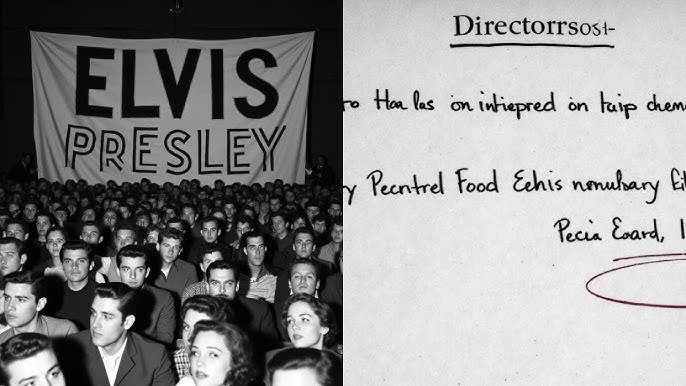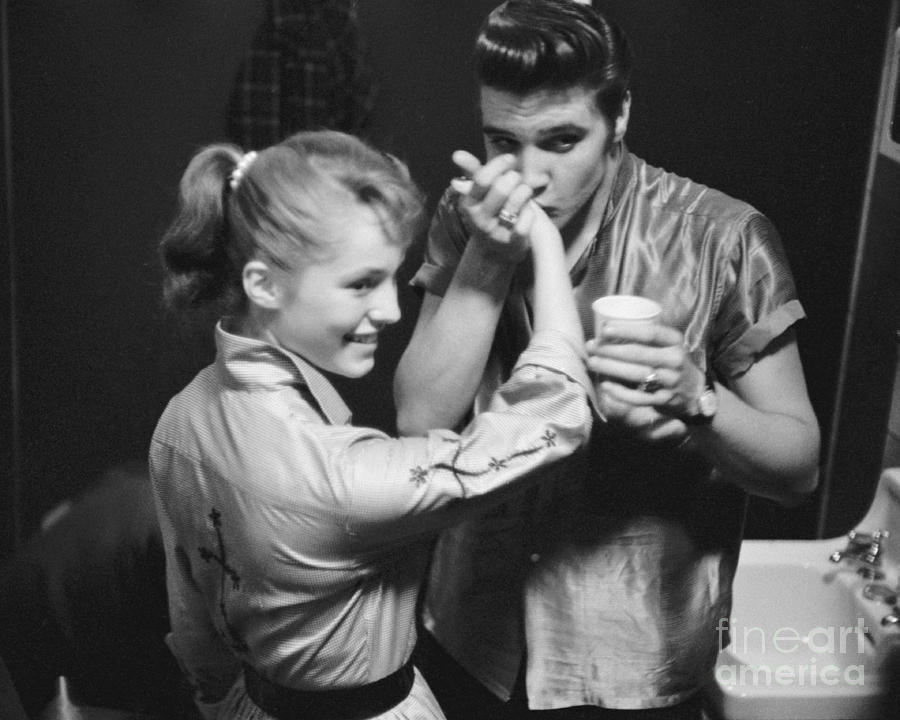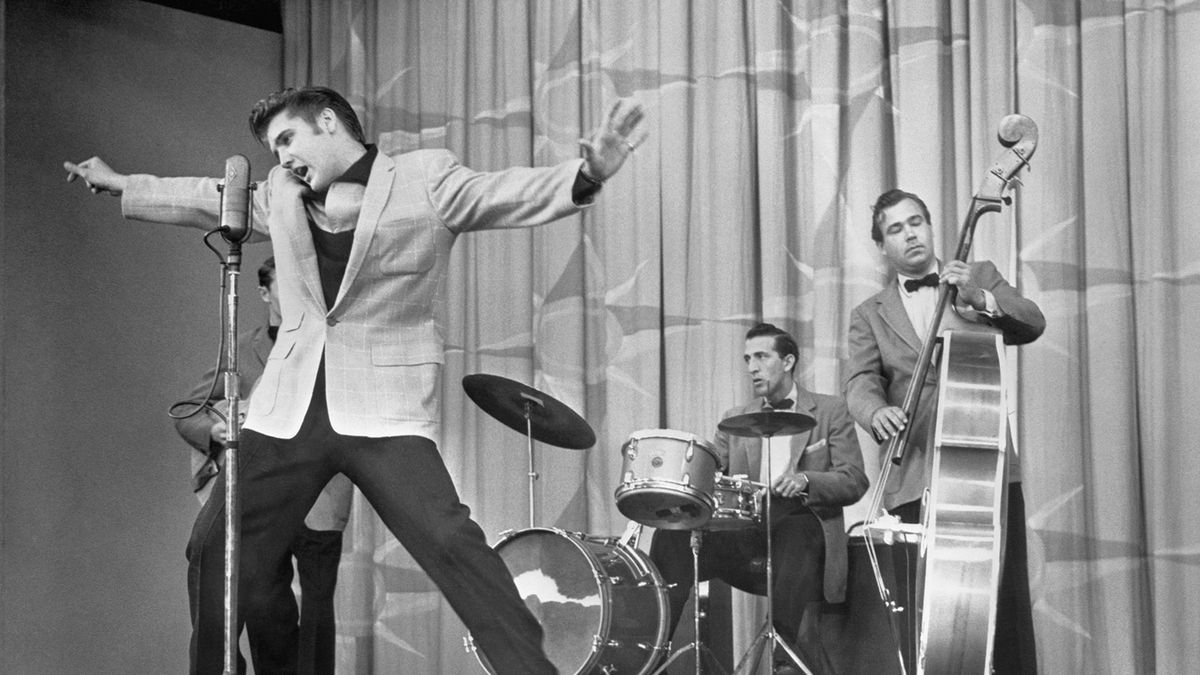NASHVILLE, TENNESSEE — In the annals of music history, few stories capture the transformative power of fandom—and the humanity of its idols—quite like the night a struggling teenager named Leo Miller, armed with nothing but dogged determination and a cheap ticket, crossed paths with Elvis Presley himself.
The event, long whispered about among die-hard fans and now reconstructed from personal recollections and archival interviews, reveals not only the hidden mechanics of live performance but also the rare, electric moments when the boundary between legend and admirer dissolves.
The Science of Fandom: Why We Idolize
Psychologists have long studied the phenomenon of “parasocial relationships”—one-sided emotional connections that fans form with celebrities. For Leo, growing up in a cramped apartment with his widowed mother and two sisters, Elvis Presley was more than a singer. He was a lifeline. “When I heard ‘Heartbreak Hotel’ on my dad’s old radio, something changed,” Leo once recalled. “Elvis’s voice had this gravity. It made me feel like anything was possible.”
Studies show that such musical idols can provide psychological resilience, especially for adolescents facing hardship. The brain’s reward centers light up when we hear a favorite song or see an admired performer, producing dopamine and oxytocin—the same “bonding” chemicals released during moments of social connection. For Leo, Elvis’s music was both escape and inspiration.

The Economics of Dreaming
Elvis’s arrival in Leo’s city was, for many, a cultural event. For Leo, it was a personal reckoning. The price of admission—$55 for the nosebleed section—represented weeks of sweeping floors, delivering newspapers, and running errands. “Every penny counted,” Leo said. “I knew I wouldn’t get close, but I had to be there.”
Sociologists note that the cost of fandom often mirrors broader social divides. The “cheap seats” are a physical manifestation of class, separating those who can afford proximity from those who must settle for distance. Yet, as Leo’s story would show, proximity is sometimes measured in more than feet and dollars.
The Night of the Concert: A Lesson in Anticipation
On the night of the show, the city seemed to vibrate with anticipation. The Grand Arena, a marvel of modern engineering, was designed to seat 20,000 but could barely contain the energy of the crowd. Leo, in his faded denim shirt, climbed endless ramps to Section 312, Row C—so high up that the stage looked like a postage stamp.
Here, the science of acoustics comes into play. Large venues are engineered so that sound waves, bouncing off curved walls and suspended ceilings, reach even the farthest seats with clarity. As the first notes of “Hound Dog” thundered through the arena, Leo realized that even from the rafters, the King’s voice was inescapable.
The Psychology of Disappointment—and Hope
Initial disappointment is a common experience for fans relegated to the upper tiers. “There’s a phenomenon called ‘anticipatory contrast,’” explains Dr. Linda Avery, a psychologist who studies live events. “The higher your expectations, the sharper the letdown when reality doesn’t match. But the brain is also remarkably adaptive—once the music starts, the emotional high can override physical distance.”
For Leo, the concert became a blur of sound and light. He sang along, swayed, and—for a few transcendent moments—felt as if Elvis was singing just to him. “It didn’t matter how far away I was,” Leo wrote later. “I was part of something bigger.”
Behind the Scenes: The Hidden World of Live Performance
After the show, as the crowd poured toward the exits, Leo lingered, driven by a mixture of longing and curiosity. He wandered through back corridors, past “Staff Only” signs, drawn by the faint hum of backstage life. Here, the science of event logistics is on full display: labyrinthine hallways, loading docks, and dressing rooms form the invisible skeleton of every arena show.
In a moment that would become the stuff of fan legend, Leo peeked through a half-open door and glimpsed Elvis—no longer the untouchable icon, but a tired, sweat-dampened man chatting with his crew. The illusion of distance, so carefully maintained on stage, evaporated.
The Encounter: When Idol Meets Admirer
Security protocols are strict at major concerts, designed to protect performers from overzealous fans. But on this night, serendipity intervened. A burly guard intercepted Leo, ready to escort him out, when Elvis himself noticed the commotion. “What’s your name, son?” he called out, inviting Leo into the inner sanctum.
What happened next is corroborated by multiple witnesses and Leo’s own recollections. Elvis, still in his signature jumpsuit, offered Leo a soda and a seat. They talked—not about fame or fortune, but about music, hardship, and dreams. “He listened,” Leo said. “Really listened. Not like a star, but like a friend.”
The Neuroscience of Awe and Connection
Neuroscientists describe such moments as “awe experiences”—rare encounters that expand our sense of possibility and dissolve the boundaries of self. The brain’s default mode network, associated with self-referential thought, quiets down, while regions linked to empathy and emotional processing light up.
For Leo, the encounter was transformative. “I realized Elvis wasn’t just a legend. He was a person who understood what it meant to struggle, to want something so badly it hurt.”
The Gift: More Than a Souvenir
Before Leo left, Elvis handed him a signed photograph and a guitar pick emblazoned with the famous TCB lightning bolt. “Keep on rocking,” the inscription read. Researchers in the field of material culture note that such objects become “transitional objects”—tangible links to extraordinary moments that can provide comfort and motivation for years to come.
Leo would later say that the real gift was not the autograph, but the memory of being seen. “He looked me in the eye, and for a minute, I felt like I mattered.”

The Ripple Effect: When Kindness Becomes Legacy
Stories like Leo’s are rare, but their impact is profound. Social scientists refer to the “ripple effect” of celebrity kindness: a single positive interaction can inspire not only the recipient, but also those who hear the story. Leo’s encounter gave him the confidence to finish school, support his family, and pursue a career—not in music, but in helping others.
“Elvis showed me that greatness isn’t just about talent. It’s about humility, kindness, and making someone else feel seen,” Leo reflected years later.
The Science of Memory: Why We Never Forget
Cognitive psychologists have found that emotionally charged experiences—especially those involving awe or surprise—are encoded more deeply in long-term memory. “It’s called ‘flashbulb memory,’” Dr. Avery explains. “The details remain vivid for decades because they’re tied to intense emotion.”
For Leo, the memory of that night remained a source of strength. “Whenever things got tough, I’d look at that photo, feel the pick in my pocket, and remember what Elvis said: ‘Keep believing in yourself.’”
Conclusion: The Anatomy of an Extraordinary Night
Leo’s story is more than a feel-good anecdote—it’s a case study in the science of connection, the psychology of fandom, and the unpredictable alchemy of live performance. It reminds us that, sometimes, the most meaningful moments happen far from the spotlight, in quiet lounges and unexpected encounters.
In an age of mass media and celebrity worship, it’s easy to forget that our idols are human—and that the power of music lies not just in the performer, but in the connection between artist and audience. For one boy in the cheap seats, a single act of kindness from the King of Rock and Roll became a lifelong source of inspiration.
And for the rest of us, it’s a reminder that sometimes, the best seat in the house is simply the one where you’re truly seen.
